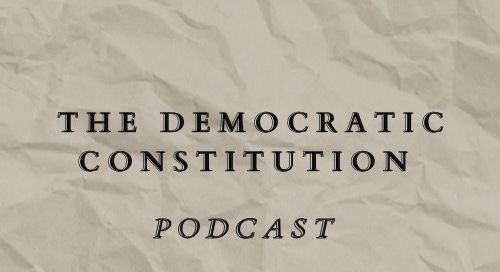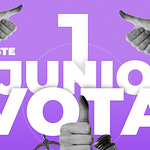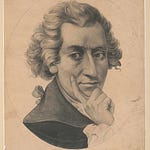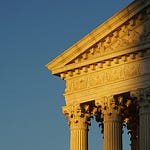The Democratic Constitution Blog is proud to introduce the Democratic Constitution Podcast and its intro episode. In this premier episode, Luke and Lucas give us their background, how they got here as well as a brief intro into democratic-republicanism and the ideology of democracy.
Below is a transcript of the episode:
How's it going, everybody?
Welcome to the very first episode of the Democratic Constitution podcast, co-hosted by me, Lucas DeHart.
And me.
My name is Luke Pickrell.
Hi, everyone.
The One Equal Vote podcast is really an expansion of the Democratic Constitution blog,
which was launched a little while ago by Lucas.
And on that blog, we are continuing to provide what I think is really a unique perspective
within the left media sphere.
And so far, we've published articles about judicial review.
We've published articles about the Senate as the graveyard of gun legislation.
We've been talking about Palestine.
We've also been talking about the far right's stated desire to change the Constitution.
And then most recently,
we've had contributions from folks talking about the malapportioned Senate,
and then also the possibility of what a new Republic of America constitution would
look like.
And really,
the blog and this podcast is really just our small contribution to the movement for
a democratic constitution.
And today, this is our first episode.
Today, we want to explain our project.
We're going to also talk a little bit about our backgrounds.
And in the episodes that follow, we're going to have interviews.
We're going to talk about important moments in the history of democratic struggles.
And we're also going to really dive into some current events.
So what is the movement for a democratic constitution?
This is essentially the political fight to overturn the current anti-democratic
constitutional order that governs the United States of America.
So to win the battle of democracy by constructing a democratic constitution that
establishes a democratic republic.
We've heard these terms ad nauseum,
you know,
growing up in history classes,
government,
right?
(00:02:18):
That democratic republic must consist of a unicameral legislative body of the
people's representatives who hold absolute power.
These representatives are elected via proportional representation in multi-member districts.
So it's important to point out the current electoral system for U.S.
politics, nationally, state by state, for the most part, is unicameral.
First past the post,
winner take all,
meaning if you get 51% of that vote,
the rest of the 49,
they don't get any representation they wanted.
They get only the opposing.
In proportional representation because of multi-member districts, it allows every vote to count.
Of course,
in Europe,
in Germany,
in a lot of European states,
when they have elections,
they have a threshold.
So if you get below 3% or whatever the percentage is, of course, you don't count.
And that goes towards second choices and yada, yada.
But so the beauty of it is in the American system,
at least to an extent,
every vote really actually counts.
So thus,
this system guarantees a representative government of the people,
fulfilling universal and equal suffrage principle essential to any democracy.
Yeah.
So Lucas and I really think that democracy and the U.S.
Constitution is the most critical topic that's facing the American left today.
And we're going to get into that.
Why do we think it's so critical?
What does it mean to talk about the Constitution?
Why should the left talk about the Constitution?
But we're taking it for granted that the Constitution is really always shaping our lives,
despite the fact that we're not always aware of how the Constitution does that.
We really do think that right now in this particular moment,
and we'll have other folks on at various points talking about
what moment are we in, so on and so forth.
But we really do think that the US is in the midst of what's essentially a long
reckoning with the meaning of democracy in this country.
What kind of system do we live under?
What does it mean to live in a democracy?
Folks are really considering how our political institutions work,
to what extent those political institutions meet their needs and their desires.
And so we really do feel like now is
The best time,
as good a time as any,
to really launch this podcast,
really up our work on the blog,
and really start having this conversation.
So what are the undemocratic bodies or institutions that are drawn up in the U.S.
Constitution?
Of course, we have the Electoral College.
Everyone understands that.
Basically, the president is chosen indirectly.
And because we have a House of Representatives and a Senate,
it malapportions it towards rural and less populated states and districts.
OK, the Senate, the U.S.
Senate.
Same kind of story.
Essentially, you have land that gets to be represented rather than in the House.
If you only had a unicameral body,
which of course is what we are demanding,
if you had a unicameral body,
the only power would reside in the House that represents the population,
the actual people,
the actual voters.
So the U.S.
Senate and its powers as the representative body of the states over the chamber of the people, the U.S.
House of Representatives.
The Supreme Court also must be done away with.
With a new top court, it must be established without the power of judicial or constitutional rule.
to overrule the democratic right to legislate by the people essentially the supreme
court in 1803 gave themselves um the power to stop legislation or decide any
legislation is constitutional or not there was no it was not in the constitution
some scholars may say it was implied but it was never in the constitution and there
was never a law passed excuse me deciding that um
This is contradictory to majority rule and creates mass inequality between states.
The entire system does this.
And so it's just really important to get to the essence of that one person,
one vote principle,
which would require that the votes actually count equally in districts.
Anyway, I think we're going to carry on now with some background.
Luke can go ahead first.
Yeah, absolutely.
So it's important to introduce ourselves to you all,
you all to just get a sense of who we are,
where we're coming from,
how we've developed our particular perspective.
I think that's always nice to know who your hosts are and why they're talking about
the stuff they're talking about.
For me, you know, helping people, caring about the world, what goes on in the world, I think that was...
very much a part of my life from the first times I started really having an interest in the world.
And there was always a sense of some folks are worse off than others.
Some folks need more help than others.
How can we live a life in which we are helping people?
And then I think as one grows older, encounters new ideas,
goes to college like I did, meets new folks.
You get a sense of the scale of issues that our country is facing.
And then you start to put all of those issues into a larger system.
Maybe you start learning about systems and why things happen.
Do they happen because there are good people or bad people or problems or mistakes or so on and so forth?
And so looking at things from a systematic perspective brought me to sociology,
and then from sociology it brought me into socialism.
And the road to the Constitution,
looking at the legal structures that shape society,
that road has gone through the interest in socialism.
And I think
What's always been present is a desire to really define things and to be as concrete as possible.
I've often said,
or I am now often saying to folks that we need to be very specific about what kind
of society we live within today.
So that we can understand it and then also explain it to other people.
So explaining our current political system as a...
constitutional regime or a liberal constitutional regime or a Republican
constitutional regime,
such and like that,
that really gets to the political structures that shape our society.
Yes, we also do live in a capitalist society, absolutely.
And
I feel that life would be better and the country and the world would be a better
place if the economy was organized around socialist principles.
But the question is, how do we get there?
How do we get the power to make the laws and make the decisions that shape our society?
And there you start dealing with the questions of politics and the law.
And as we'll explore in
future episodes,
you can't talk about questions of politics,
power,
the law,
decision making in the United States without talking about the Constitution.
A lot of folks do.
Of course, you can, of course, literally talk about it without mentioning the Constitution.
But as we'll explain, you're missing a fundamental piece.
And the conversation is really incomplete and incomplete,
we think,
in a way that's really limiting what the left can do and our ability to change the country.
And of course,
along the way,
I've been influenced by other people who've been thinking about these ideas longer
than I have.
I've been
sparring with other folks often on,
you know,
you're always throwing ideas back and forth between other folks.
And it's interesting to see how different political positions interact with the
Constitution and think about democracy.
So that's just a little bit of how I've wound up talking with you all today.
But Lucas, tell us, tell us how you got here.
Yeah, well, you know, Luke and I, obviously, we met.
We are both members of Marxist Unity Group, a caucus within DSA, Democratic Socialists of America.
And so that's how we kind of connected.
But I grew up, you know, in California.
Both Luke and I grew up in California.
I had a...
I had public high school parents, basically, public high school teacher parents.
They were influential in the union.
They were presidents both at different times.
They were very pro-labor, of course.
And again, the whole history thing basically put in my butt, I would say.
When I went to college, that's what I wanted to study was history.
And those were the classes, history, English to an extent, sure, but history, political science,
These were classes that interested me.
And so it's always just kind of been a passion thing, right?
And it transformed very easily towards politics.
You know, what do we see around in our environment?
How do we see our future playing out, right?
And so I came to a point of view of, again, also like, oh, maybe it's socialism.
Maybe it's socialism.
But I've learned that far more, it cannot just be socialism.
It must also be democracy.
And
Luke and I have come to this understanding, again, being influenced by other people.
I grew up because of my parents,
particularly my father,
and the friends he made in his early life around education and organizing and
factory organizing and all that.
I met political mentors that have been thinking about this idea of the democratic
constitution for a very,
very long time.
They were involved in the SDS,
new left years,
as well as in the later 70s and early 80s of the new communist movement that came
out of that.
And so I've had these figures who have been thinking about these ideas for a long time in my life.
I've been very fortunate to kind of grown up with that.
And I've come to a point after going through school, but also on my own, just educating and
talking to great minds like luke that this is the issue um that that it's got to be
more it's about political power um in the united states constitution blocks the
american people from having political power in the form of a majoritarian um form
of government a democratic form of government um there are blocks at every every
turn we are taught about these checks and balances and
And you learn, you know, as you go through life, how do these things actually work in practice?
And so and so that's a little bit of how I got to where I got and how me and Luke are here.
Yeah, absolutely.
So touched a little bit on why we've created this podcast and what we're trying to do.
But let's dive into that a little bit more.
The main idea is that we want to be a voice, and hopefully there will be more voices like ours.
There already are, but in small places.
A voice that really represents and motivates and discusses this movement for a
democratic constitution,
and really
catapults it or raises it to a higher level within folks' political conscious.
We'll continue, I think, throughout all of our episodes to really explore what that means, because
There is already a certain level of consciousness that folks have around democracy and the Constitution.
We talked about being in the midst of a particular moment in history, and we really think we are.
But it's just beginning.
It's just starting, we think.
We might be wrong, but we'll keep exploring that.
But we want to, at the very least,
vocalize all of these things and distribute them for conversation and get folks in dialogue yeah so
There is no,
just to finish that up a little bit,
like there is no political organization or media that is solely dedicated to this,
right?
So it's like, that's what Luke and I hope to do.
It really is about making this the political conversation,
forcing it,
you know,
without being so figurative,
forcing it down people's throats in the sense of like,
if you don't face this obstacle,
if you don't think about this obstacle,
we,
we feel as if we'll be running in circles again,
like the left has been doing for the last hundred and plus years in America,
you know?
And so, um,
So that's just something to hit home a little bit, that we believe this is that important.
We believe that this is the key that connects all of the democratic movements that
exist in America,
those for a higher wage,
those that are fighting climate disaster,
those that are fighting for safer conditions,
living conditions,
healthcare,
against war.
Okay, so what is the democratic ideology?
What is this democratic republican ideology?
Democratic republicanism is the belief in a representative form of government,
a republic,
but a republic of the people.
So the demos,
the state form of a democratic republicanism is a unicameral legislature with
representatives elected by universal and equal suffrage.
So what that means is,
again,
you get rid of things like the Senate,
or as we see in the UK,
they have the House of Lords,
which can delay financial and tax legislations
But they are not elected.
They have no other representative power.
The House of Commons is the political institution.
And so what we're talking about is the way in which only you and your
representative vote counts and matters.
So the demos, meaning the republic must represent the people universally.
So people – we always talk about universal suffrage,
but equal suffrage is just as,
if not yet just as important.
Thomas Paine,
one of the great framers,
founders,
whatever you want to name him,
he always said – he wrote Common Sense,
of course.
He said the most important vote of all – sorry,
the most important right,
the most fundamental right of all is that right to an equal vote.
For without it, every other right is subject to the undemocratic nature of the system.
Now, I'm paraphrasing it, but that goes to the nature of this message of one person, one equal vote.
So, again, Democratic Republicanism also believes in universalism.
These are universal rights.
We believe in a society that takes care of everybody universally, proportionally.
These are policies that are implemented by the Democratic Republic,
and they should be enforced,
provided equally and proportionally.
Yeah.
Yeah.
You know,
as we were talking,
Lucas,
I was thinking,
if we already haven't made it clear so far,
there are just so many different conversations that happen out there on the left
that are brought to us by so many really smart people.
and very well-educated and very articulate people.
And that's never going to stop.
I think there will always be a high level of discourse.
So long as you have human beings out there who are curious and who want to talk
about things and who have a means of talking about things that they're interested in,
There's always going to be talk.
There's always going to be podcasts.
There's always going to be magazines.
There's always going to be books, articles, so on and so forth.
And so at the end of the day,
you know,
I think we think that in order to make a political intervention,
one has to center on something that they feel like is the most important thing.
Either it's a link in the chain,
if you want to call it that,
or the root of the problem,
so to speak,
and concentrate one's energy on that thing.
There might be other very interesting things in the world.
There might be lots of other problems in the world, lots of different things going on.
But really what we're trying to do with this podcast and with the blog is really
hone in on that thing that we feel is the most important and the most crucial.
And that's what we'll likely be discussing with folks.
How important is this thing?
And we'll also be bringing in folks who I would imagine agree with us that it is
very important and that it is that thing.
So our audience is going to be a variety of folks,
folks who are interested in politics,
folks who are interested in the Constitution,
folks who think the Constitution is one of several problems in the world,
folks who think that the Constitution is the problem,
the question that's been lacking.
So
Just to give everyone a little bit of a teaser,
we'll be having episodes in which Lucas and I talk about various historical events,
also books.
And then we also are very fortunate to have contacts with a lot of the folks who
have written these books and who have talked about this history a lot longer than
we have.
And so we'll be bringing those folks in for interviews too.
And of course, we'll keep updating the blog.
We run the blog.
put out a new article on Wednesdays and Fridays, and we'll keep bringing that all to you.
Yeah,
I just want to say thank you all,
and follow this podcast,
follow the blog,
if you're interested in these things.
And we look forward to continuing this on.
Okay, until next time, everyone.
Take care.













Share this post